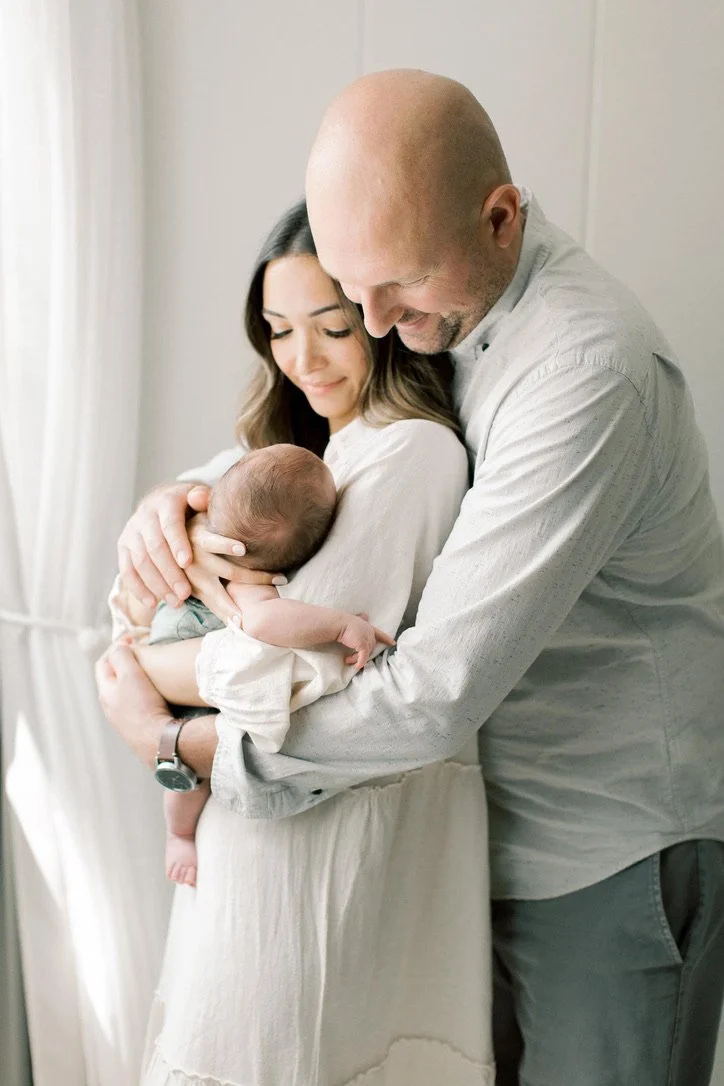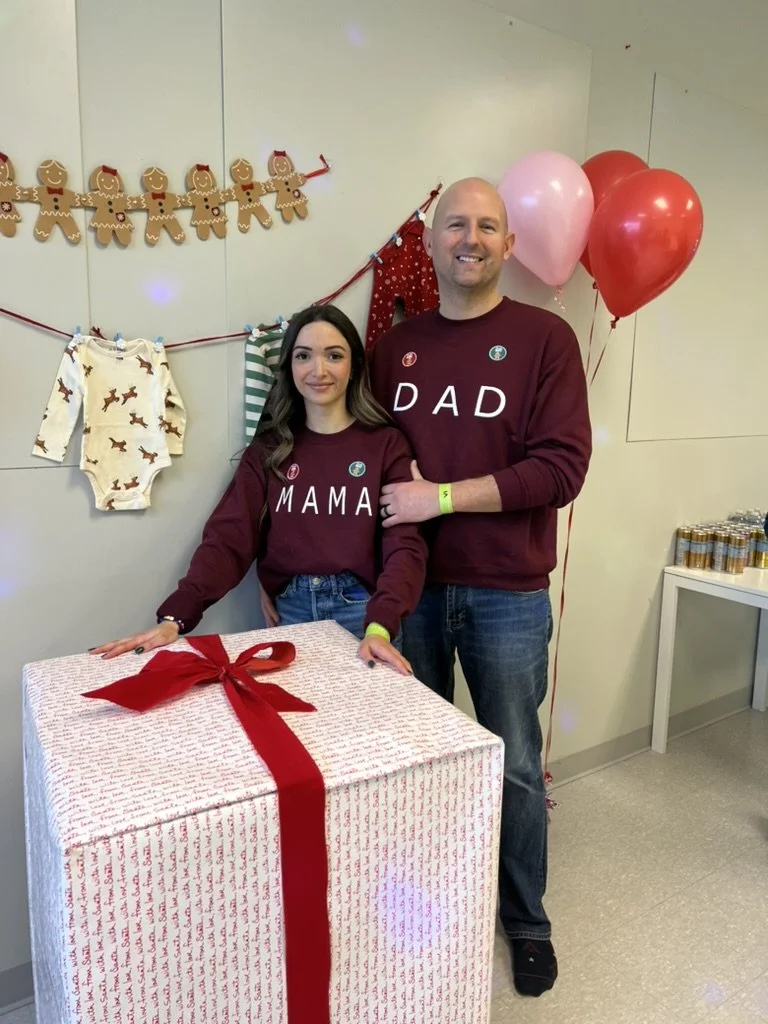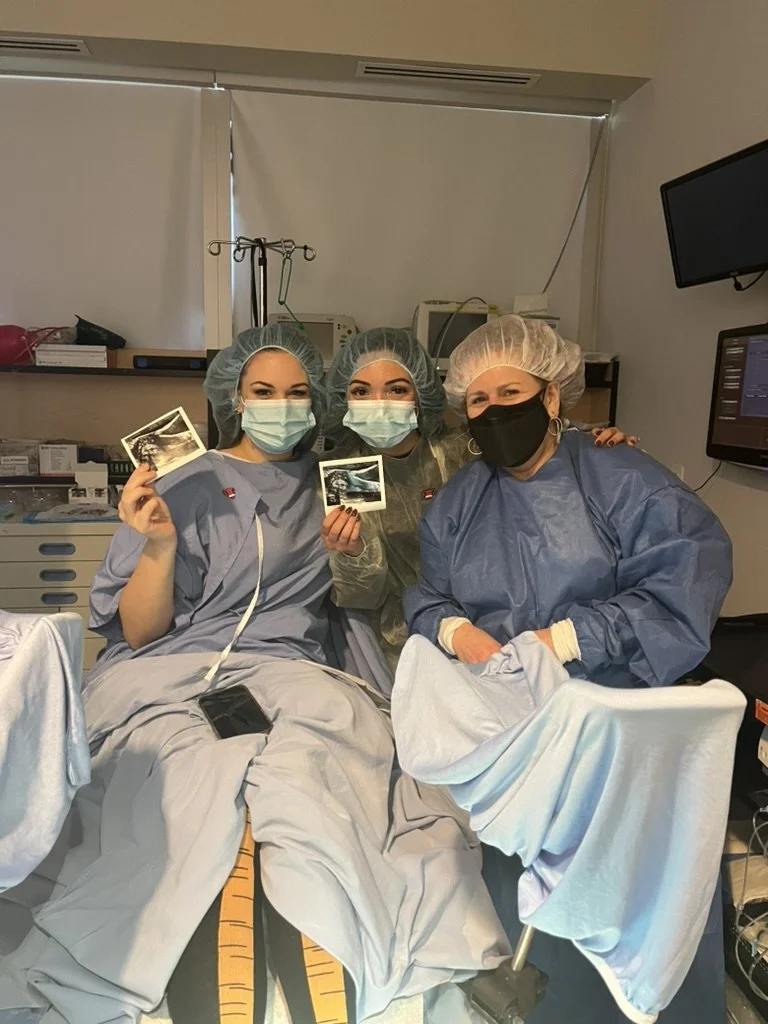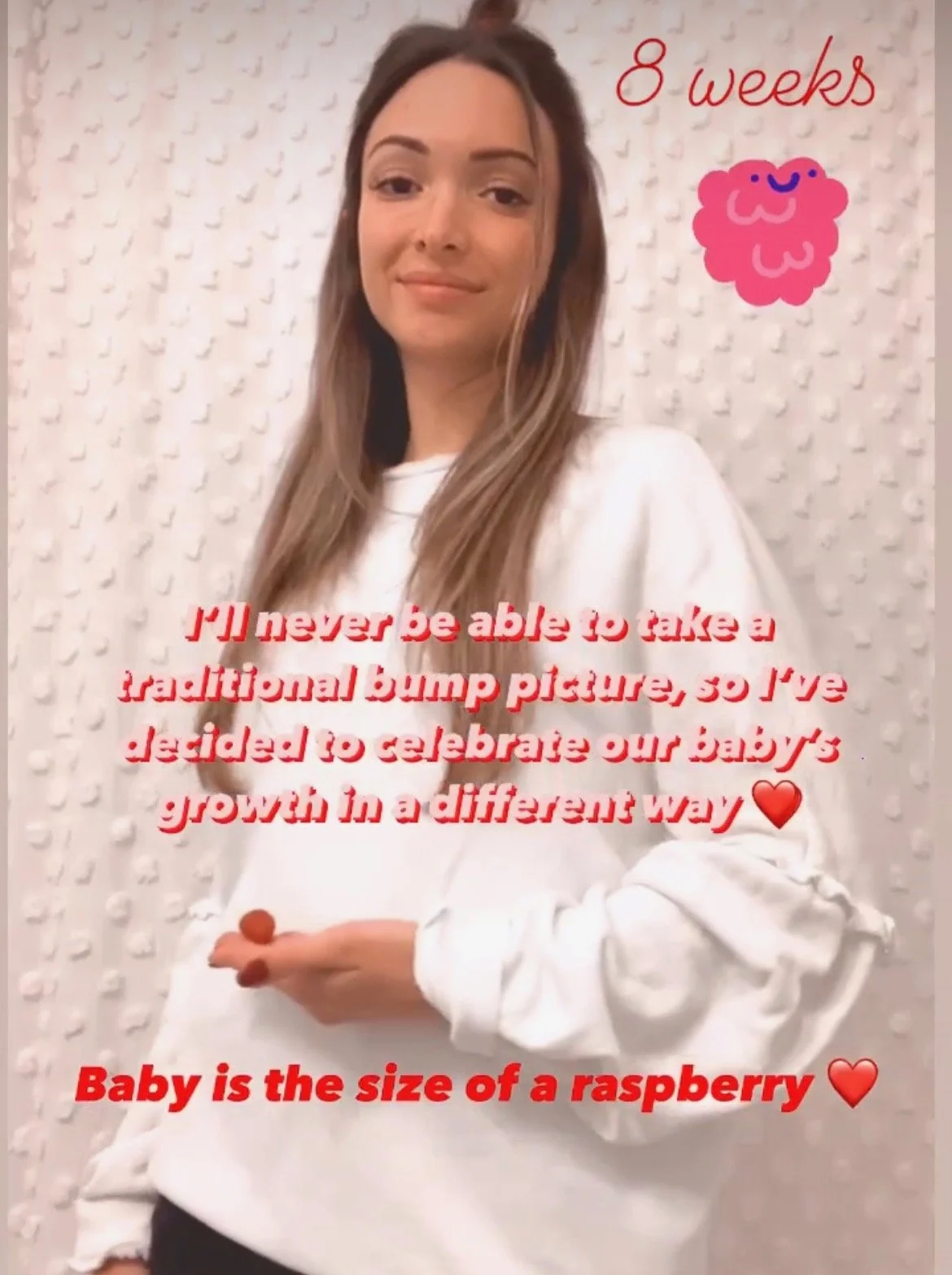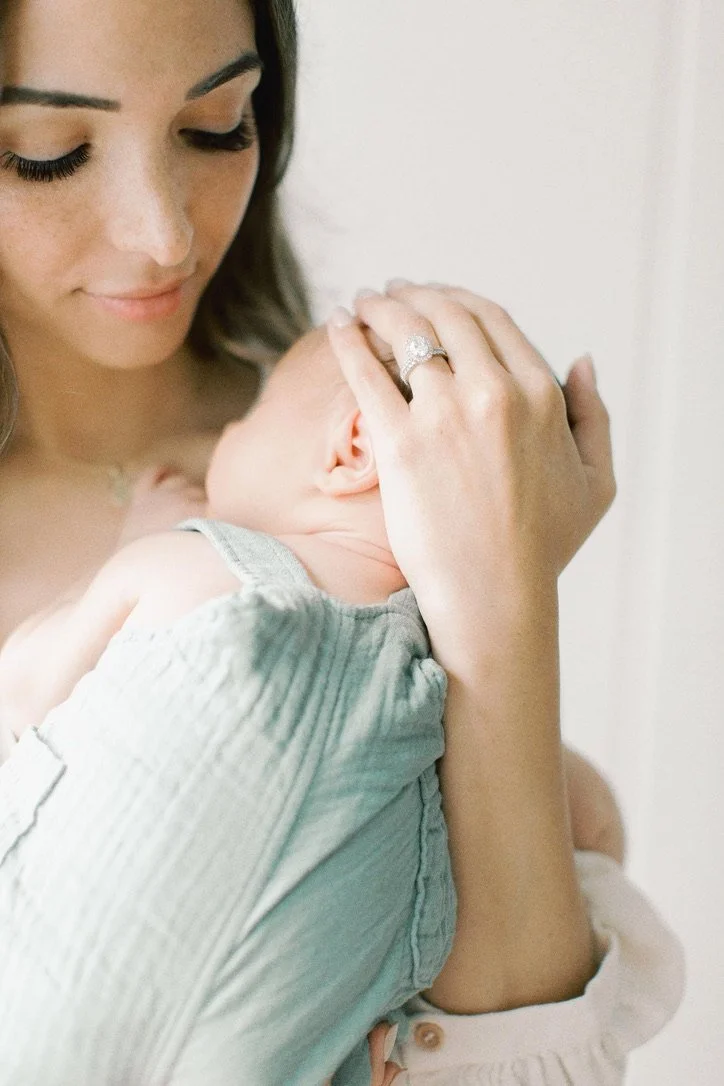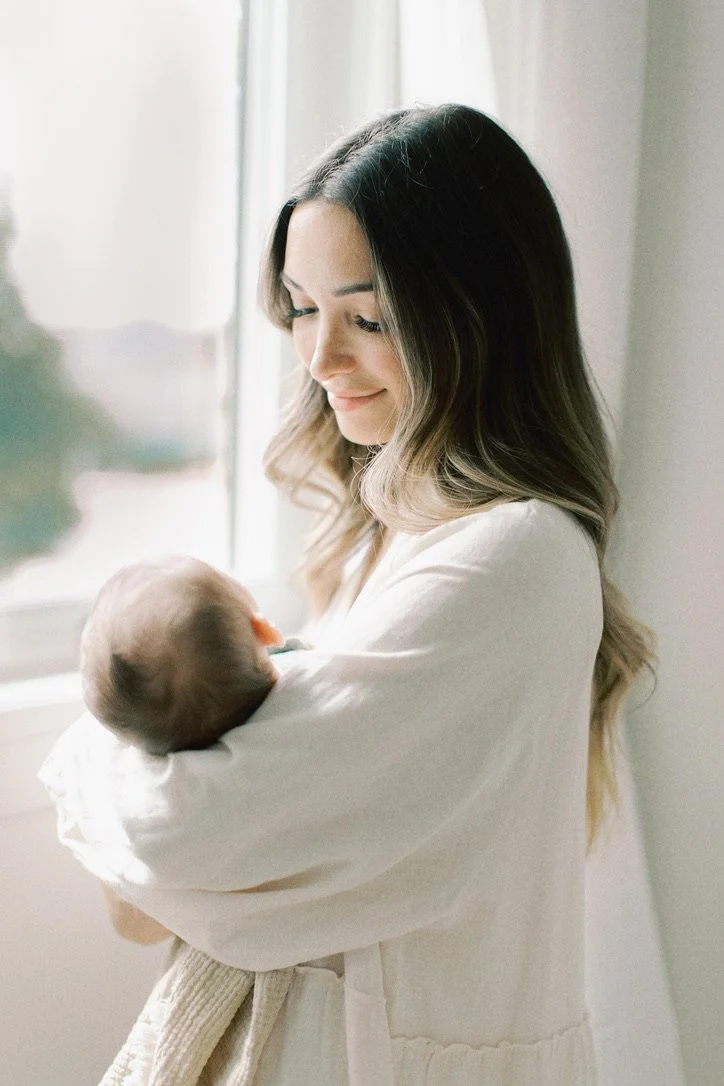Cervical Cancer to Intended Parent: Marissa’s Infertility Journey
Marissa was the picture of perfect health and thought she was going to be the most fertile person. She tried to eat healthy, was always taking prenatal vitamins so her body was ready when they wanted to try to get pregnant. Infertility was never a thought in her mind.
When Marissa met her now husband, he had shared with her that he had testicular cancer years ago and wasn’t sure about the quality of his sperm or if they would have to explore fertility treatments. But, to Marissa, that was a small bump in the road because she was so sure she would get pregnant. However, two weeks after that conversation, Marissa learned after a routine exam that she had highly abnormal cells and despite all the doctors saying she didn’t have cancer because she was so young, she learned she had cervical cancer. What Marissa thought would be an easy journey to parenthood turned out to take more twists and turns than she ever could have imagined, filled with grief and loss that she had to learn how to hold while continuing to move forward.
“The emotional impact of this journey is something that I have been working on since it started, and I don’t think I will ever be over it.”
AN UNEXPECTED CANCER JOURNEY
“After learning I had cervical cancer, it was recommended that I try one procedure that would shave off a layer of my cervix. When they did the procedure, they found another tumor behind the original one and they couldn’t shave everything out because of how big it was. They ended that procedure advising me to undergo a fertility preserving surgery called radical trachelectomy. They sent me home with very little information about the procedure and I started my own research and I learned that they would investigate whether the cancer had spread to my lymph nodes or other areas. If it was found in my lymph nodes, they would complete a hysterectomy and attach my ovaries to other organs to maintain the blood flow.
I was in shock that a hysterectomy was even a possibility and when I spoke to my doctor, he said while it could happen, it was uncommon and unlikely for me. I went forward with the surgery and because there were additional tumors, they had to remove more from my uterus than they anticipated. I woke up from the surgery with half my uterus when I thought only the bottom was removed.
I never thought to question how much of my uterus was preserved because I was never educated to ask that, and my doctor was not there to explain anything to me. I knew I was going to do the surgery, but I didn’t want to just sign a paper 15 minutes before the procedure that said removing my entire uterus was a possibility. I wanted to know this from my doctor and not Google weeks before so I could have time to process.”
ONE INFECTION AFTER ANOTHER
“After the tumors were removed, they put a cerclage in to prevent an incompetent cervix if I were to get pregnant. Every time I would go in for a follow-up appointment and biopsy, it felt like someone was sawing the inside of my vagina and the doctor would disregard my pain and tell me ‘You’re fine…just breath’.
After not having my period for a year post surgery, I was referred to a fertility clinic. I shared with the new fertility doctor that not only had I not had a period in a year, I was also experiencing so much pain. The doctor decided to start with a sonohysterogram to look inside my uterus but couldn’t find an opening to even get in. She couldn’t see a cervical or uterine opening because everything had become so infected, which explained the discharge and pus I was experiencing daily. With such a major infection, the doctor recommended I go back to my oncologist to have him remove the cerclage and clean everything up.
We wanted to start IVF right away and so I went back to the oncologist for him to do the surgery and when I woke up from the procedure, the nurse informed me that the cerclage was removed, everything was cleaned, and they replaced the cerclage with laminaria to help keep my cervix open. When I was 12 weeks pregnant, the nurse advised I come back, and they would put another cerclage in.
The oncologist had disregarded the advisement of my fertility doctor and as a result, my body rejected the laminaria and was majorly infected once again. I had to wear a diaper because of the amount of discharge that was coming out and after two weeks of extreme pain, I went into the oncologist and told him he had to take the laminaria out. He finally agreed and without any pain medication, he got his forceps, ripped out the stitched-in laminaria, slapped it on the table and told me good luck getting pregnant.
He walked out of the room, and I was left there bawling my eyes out wondering what just happened to me.”
“Trust your doctors AND advocate for yourself relentlessly…We’re patients but more importantly, we are humans and should be treated as such.”
ANOTHER SURGERY, ANOTHER SETBACK
“I returned to my fertility doctor without a new cerclage and after sharing my terrible experience, she scheduled the surgery at her hospital with the head of gynecology. The plan was that we’d do the surgery, I’d recover for a month, and then we were going to get me pregnant! This was going to be the answer to us finally starting our family. I have a video of myself walking into the hospital alone the day of the procedure because it was COVID, and I called out to my husband: ‘We’re gonna get pregnant!’
The procedure should have taken an hour, but I woke up after a five and half hour-long surgery and I couldn’t speak. There was blood coming out of my stomach, bandages on my arms, and a catheter with pee hanging off my bed. A nurse was sitting next to my bed watching me since I couldn’t have any family with me that day and the fertility doctor came over to tell me what had gone wrong. When they went in laparoscopically, they accidentally cut the ureter and it fell apart. They had to call the urologist on call and do an emergency reparative surgery, where the inserted a stent that would remain in place for four months. When I regained my ability to talk, the first thing I asked was when I could start IVF and get pregnant, and the doctor told me it would be at least four to five months before we could start trying.
They sent me home and it was a long and painful four months. Again, I was wearing a diaper because of discharge, I could barely eat, and was in chronic pain, unable to stand for more than five minutes at a time. The stent was eventually removed the stent, and we were finally cleared to start IVF!”
THE FRESH EMBRYO TRANSFER THAT NEVER HAPPENED
“I started all the IVF medications, stimulated well and they were able to retrieve 22 eggs during my retrieval. The plan was to go forward with a fresh transfer five days after the egg retrieval and so five days later I’m back in the clinic ready to go. It’s a different doctor that day but I didn’t care since we were just sticking the embryo in but once I laid down and the doctor started poking around, he quickly became silent. All I could feel was one poke after another and when I asked what was going on, he said there was no opening to my uterus!
I was in shock since the purpose of the last surgery was to put a cerclage in with a catheter to hold the space open. However, this doctor was sitting in front me of saying he couldn’t get in to complete the transfer. I was determined not to leave without my embryo inside my uterus but after an hour of the doctor trying to dilate me without sedation and me crying because it hurt so much, the doctor said he couldn’t continue.
I had been in the procedure by myself again because of COVID and when I came down the elevator to meet my husband, he was standing there with hands in the air ready to celebrate our transfer, and I crumbled in tears because of the embryo transfer that never happened.”
“I could see my surrogate pregnant with my baby and then I had to leave, and it felt like I was leaving my baby.”
WHEN SURROGACY BECOMES YOUR ONLY OPTION TO START A FAMILY
“Because my last surgery was so chaotic with the ureter being cut, the team forgot to put the catheter in so there was nothing to hold the space open. That started a series of procedures to try and dilate me but there was no success. During this process, I met with my new oncologist and shared my journey up to that point with her. She was incredibly kind and said she wanted to send me to an infertility specialist who deals with patients just like me, having gone through cancer and the surgeries that I had experienced.
I met with the new fertility doctor and told her that were countless people who have tried to get into my uterus with no success and her first response was ‘I’m pretty sure I can get in there; not to worry.’ I had my doubts, but she put me under conscious sedation and within three minutes…three minutes…she got in! However, my elation was short lived because she then shared with me that my uterus was atrocious. With how large it was, and the amount of scar tissue present she wasn’t surprised I didn’t have a period.
The doctor also shared that if I were to get pregnant, which would be a miracle, the chances of me miscarrying before second trimester, having an extreme preemie, or having a child with a deformity was incredibly high. She said it wasn’t safe for me to be pregnant and it wasn’t safe for my baby. Instead, my husband and I were urged to consider surrogacy and advised to not even try to get pregnant on our own.
It took time but that was the start of our surrogacy journey that led us to our little boy!”
THE WEIGHT OF GRIEF ON MY FERTILITY JOURNEY
“I can no longer remember the pain of my surgeries or the needles from IVF treatments. I would go through it all again tomorrow if it meant I could carry and have a healthy baby. The emotional impact of this journey is something that I have been working on since it started, and I don’t think I will ever be over it. The impact of my journey is something that I will carry for the rest of my life.
The two biggest feelings I held were grief and fear of the unknown, coupled with the loss of control. At first the doctors said I didn’t have cancer and then it ended up that I did. I questioned if I was going to live or if I was going to die and that was wrapped in the fear of the unknown with no control. When it was time for my surgeries, they would say it was going to be fine and then I’d wake up and it was not fine. That cycle would repeat itself over and over again.
Every time something happened, I had to grieve something new. I had to grieve the loss of not being able to carry a baby, grieve the loss of not having all my organs, grieve the loss of not having a period indicating that I am fertile, grieve the loss of my fertility and my womanhood. There is just so much grief in my story.”
WHAT WOULD IT BE LIKE TO CARRY MY SON?
“What would it have felt like to feel him inside…I grieve not being able to feel my son kick.”
“I look at my son who we had through surrogacy, and I don’t even know how to describe how much love I have for him. I also look at him and wonder what it would have been like to carry him. What would it have felt like to feel him inside and to feel each of his kicks. I grieve not being able to feel my son kick.
His pregnancy with the surrogate took such an emotional and mental toll on me because I was so caught up on whether he was going to know who I was or whether we would bond. I didn’t know if he was going to love me as his mom or if he was going to know me. I had daily thoughts about what it would be like to carry my son and sometimes I would allow myself to wonder if I should try to get pregnant. I would then start the grieving cycle all over again because No, I cannot try to get pregnant naturally because of how dangerous it would be for my baby. Every chance that I thought could be a renewed chance of hope would get squashed by grief.”
TRAUMA LIVES IN THE BODY
“It’s been my experience that trauma absolutely lives in the body. I can no longer go near the hospital of my first oncologist without shaking and bursting into tears. Just driving by makes me extremely anxious. I recently had a family member who was admitted into that hospital and needed to go and visit the family member. However, I broke down into tears while in the parking lot and I couldn’t set foot in the building. My reaction is completely involuntary, and my body has a visceral reaction that wants to keep me away out of protection.”
FOCUS ON MY END GOAL – HOLDING MY BABY
“I originally started my infertility journey feeling like I was responsible, and I’ve done the work to now believe it is not my fault. I didn’t choose to have cancer and I didn’t choose to be infertile. The one thing that kept me going was staying focused on my end goal of having a baby and I didn’t care what I had to do. If I needed to stick myself with needles, I would stick myself with needles. If I needed another surgery, I would do it. When they said surrogacy was the safest option, I jumped on board.
I made a vision board to keep me focused on my end goal of having a baby and I bought a onesie faith purchase. I pinned it to the vision board to look at it every single day and I repeated to myself: ‘keep going, keep going, keep going.’
Community was the other thing that kept me going. Seeing people with success stories was helpful but even more so was speaking to others who hadn’t experienced success and were still in the process. When I asked how they felt and learned it was similar to me, it helped normalize what I was feeling.
Community was also where I found my surrogacy world and was able to throw myself into advocacy. I started to help other intended parents going through the process and started my new business because of it. I knew what it felt like to walk the path of surrogacy and wanted to help others find their way through it, as well. Pouring myself into helping others motivated me and rooting myself in community gave me strength to keep going on my own journey.”
“The one thing that kept me going was staying focused on my end goal of having a baby and I didn’t care what I had to do.”
PREGNANCY AFTER LOSS
“Being pregnant with our surrogate after our grief and loss was beautiful and also odd. I could see my surrogate pregnant with my baby and then I had to leave, and it felt like I was leaving my baby.
The surrogate who had our son was also our second surrogate after the first one had two failed embryo transfers and things didn’t end well. That experience made me question why the experience with our second surrogate would go any differently and I was nervous the entire pregnancy. It was not until I held our baby in my arms that I finally exhaled because up until that moment, it wasn’t real for me.”
GROWING YOUR FAMILY IS OUT OF YOUR CONTROL
“I’m into my third surrogacy journey trying to pass medical clearance and this round feels a bit different than the others. I feel less desperation because I already have a living son and I also understand that I’m not guaranteed a baby. Nothing is guaranteed in IVF. Unfortunately, I feel like walking this path is more about luck. You can have the perfect conditions, perfect embryos, and perfect carrier and you may not have success. Then you could have less than ideal conditions and embryos, nothing goes smoothly, and the surrogate ends up pregnant. IVF is never a guarantee.
Walking this path results in a loss of control and you are forced to accept things as they are. I feel incredibly full with my son AND still feel like my family is not complete. However, I don’t have that choice or control to just grow my family the way I wish I could. I’m going into this third round anxious and nervous, fearful of the unknown. I’m left wondering if we’ll have another baby and whether we’ll be able to able to give our son a sibling. And I also must accept that it's completely out of my control.”
BECOME YOUR BEST ADVOCATE
“Trust your doctors AND advocate for yourself relentlessly. Every doctor I spoke to at the start of my journey was wrong. I felt brushed aside and looked over every step of the way. I learned to take my care into my own hands to make forward progress. Doctors are often over worked and over tired or they’re burnt out and they don’t have the same care and passion they had when they started. If a doctor, nurse, or administrator appears annoyed at you or any of your questions, don’t let it deter you from pressing for answers. Don’t end up in a spot down the road where you wish you had pushed more or asked more questions.
We are patients but more importantly, we are humans and should be treated as such. During my cancer journey, it wasn’t society or my family who made me feel dehumanized, but it was my oncologist, the person who was supposed to be saving my life. While he might have saved my life in the perspective of helping me beat cancer, he damaged so much of my mental health in the process.”
“You deserve so much grace for every step you take on your journey.”
FOR THOSE WALKING THE PATH OF INFERTILITY
“Find community! You don’t have to share publicly but I encourage you to message people within the community. We’re all very willing to talk, help, and become friends because we were once, or we are in your shoes. We know what it’s like to be isolated and alone and you should not endure this journey alone.
Give yourself grace. We often treat others better than we treat ourselves. When going through infertility we are going through incredibly hard challenges and if we had a friend walking these steps, we would never be as hard on them as we are on ourselves. We are quick to criticize ourselves for everything, to blame ourselves, and shame ourselves. We wouldn’t do that to a friend going through infertility so, why do we do it to ourselves?
Remember, none of this is your fault. We are all trying the best we can and the fact that we are getting out of bed and living life in general while going through such hard things is amazing. We’re incredibly resilient, incredibly perseverant, and incredibly strong. You deserve so much grace for every step you take on your journey.”
Marissa continues to be an advocate for others, especially those walking the path of surrogacy through her business, Defining Journeys, where she coaches and consults intendend parents. You can continue to follow Marrisa on her third surrogacy journey and her journey as a mama @definingjourneys.

